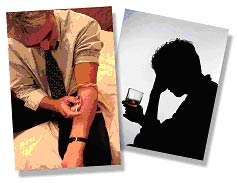
Tackling Drug Addiction - For Parents and FamiliesInformation for the friends, parents and families of drug addicts
…from your Partners in Patient
Care.
|
|||||||||||||||||
|
AUDIO: Click the Play buttons below to listen!
Healthcare Professionals
|
|
Families and friends of drug abusers / drug addicts are often faced with a situation they feel totally unequipped to deal with, beginning with a basic lack of information and drug and alcohol awareness. As a result drug addiction is often misunderstood. Parents may be too afraid to seek help, deterred by the stigma of having a drug user in the family and worrying about what people will think of them. There are also the more serious concerns about their son or daughter breaking the law, possibly facing expulsion from school or even facing charges of possession or supply of an illicit drug. These things can make it seem impossible to approach the authorities to gain the professional help they need for fear of the legal implications. In 2003, David Blunkett, then the UK Home Secretary, launched a two year anti-stigma campaign to help dispel the feelings of shame and embarrassment experienced by some families of drug users / drug addicts which sometimes prevents them from accessing the support and advice they need. The Government’s Drug Strategy aimed to encompass not just those with a drug addiction, but the families of drug users – the ‘forgotten victims of drug abuse’ – by providing services for parents and carers. Part of this campaign was the introduction of FRANK, an independent Government funded drugs helpline which replaced the National Drugs Helpline. In a seven month period in 2007, the total number of calls made to FRANK was 26,059 which is an average of over 120 calls per day, illustrating the obvious public need for further information on drug and alcohol abuse / addiction. A breakdown of the calls made to FRANK for the period between 1 April 2007 to 1 November 2007 shows that the drug which was the subject of the most calls was Cannabis / Marijuana, totalling 6617 calls which represents just over 25 percent of the total number of calls within the seven month period. According to statistics, this is the most widely taken illegal drug in schools. This was closely followed by Cocaine totalling 5728 calls at just under 22 percent of the total call volume. At the other end of the scale, the two drugs receiving the fewest calls were Viagra, attracting 11 calls and Khat, (a herbal stimulant which is legal within the UK, although illegal in many countries including the USA) attracting 6 calls. Although alcohol abuse and binge-drinking is an increasing problem in society, calls regarding this only accounted for 2.92 percent of the calls. Parents concerned about their children, or friends of drug users, can access immediate advice regarding all aspects of drugs and alcohol addiction in confidence and anonymously. The free and confidential FRANK helpline, also found online at www.talktofrank.com, aims to support families as well as users and contains an A – Z of drugs, FAQ sections, details of where to find support, etc. Drug-Aware were recently added to the talktofrank database as a useful resource for their website visitors. Visit our listing on talktofrank.
If you need further
help / support: Some parents may choose to purchase home drug tests as the first step towards regaining some control over their child’s drug and alcohol abuse / addiction.
Drug Addiction: Drug Testing Children or Teenagers
Someone recently
asked what my position was on drug testing children / teenagers.
Here is a brief version of my answer.
|
|
||||||||||||||
|
|
|
|
© Drug-Aware Ltd 2002-2012. Unauthorised duplication or use of material from this web site is strictly prohibited. ALL RIGHTS RESERVED.
“Drug-Aware”, the Drug-Aware Logo and “Your Partners in Patient Care” are all Trade Marks of Drug-Aware Ltd.
Disclaimer - Whilst Drug-Aware Ltd has made every effort to ensure that all Drug Addiction information on this web site is current and accurate, we cannot be held responsible for any losses, damages, costs and other consequences resulting directly or indirectly from using this site and any information or material available from it. To the maximum extent permitted by law, Drug-Aware Ltd excludes all liability to any person arising directly or indirectly from using this site and any information or material available from it.
Sitemap NEW! Visit our Blog! for Technical Support and Drug / Alcohol Addiction Articles

